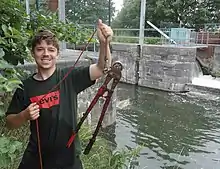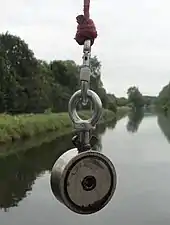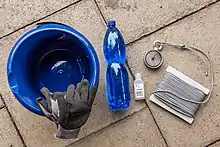Magnet fishing
Magnet fishing, also called magnetic fishing, is searching in outdoor waters for ferromagnetic objects available to pull with a strong neodymium magnet.[1]


The hobby is a combination of environmentalism and treasure hunting. The magnets used are strong enough to remove large debris such as discarded bicycles, guns,[2] safes,[3] bombs,[4] grenades,[5] coins and car tire rims from bodies of water, but many who engage in the hobby are hoping to find rare and valuable items as well.[6][7]
It is thought magnet fishing was initially started by boaters using magnets to recover fallen keys from the water.[8]
Tools

Magnet fishing is typically done with gloves,[9] a strong neodymium magnet secured to a durable rope between 15 and 30 meters (50–100 ft), and sometimes a grappling hook as a supplement to the magnet.[10]
Potential harms
Some magnet fishers have retrieved dangerous objects, including loaded guns, unexploded ordnance,[11][12][4][13] and sharp pieces of metal.[9]
Neodymium magnets are powerful and can interfere with pacemakers, posing a health risk; they can also damage other electronic devices. Fingers can get crushed between the magnet and a piece of metal, potentially causing serious bodily harm.[10] Tetanus can also be a risk for those without an up-to-date tetanus vaccine.[6]
Magnet fishing and the law

Depending on the jurisdiction, anything of value may belong to the local government, not the finder.[11]
England and Wales
Magnet fishing is subject to local regulations concerning outdoor waters. The Canal & River Trust, which owns most of the canals in England and Wales, has bylaws prohibiting people from removing material from the canal and rivers it owns, so fishers may be subject to a £25 fine[14] for magnet-fishing or removing any material from canal or inland navigation under the control of the Canal & River Trust in England or Wales, other than the Lee and Stort Navigation, Gloucester and Sharpness Canal, and River Severn Navigation.[15] The Trust "expressly prohibit[s]" the practice, although it refrains from legal action against first-time offenders.[8] In 2018, a child magnet-fished a sawn-off shotgun out of the Titford Canal in Oldbury, West Midlands.[16]
Scotland
Magnet fishing is allowed in Scotland, as long as the fisher has obtained a Scheduled Monument Consent from Historic Environment Scotland, and permission from Scottish Canals. An official group exists which gives its members permission to magnet fish in a stretch of the Union Canal in Edinburgh, with more locations planned in the future. Archaeological or historical finds must be reported to Treasure Trove Scotland. [17]
Belgium
Amateur magnet-fishers in Belgium helped the police by recovering new evidence, specifically firearms and ammunition, related to the crimes of the Brabant killers.[20]
In general, police urge those who find weapons or similar items to contact them.[8][21]
Poland
According to Polish penal code, magnet fishing without a valid government permit is a crime punishable by up to two years imprisonment.[22][23][24]
United States
In the US, there are no federal laws restricting metal fishing. Magnet fishing in state waters without a license is prohibited in South Carolina under the Underwater Antiquities Act.[25] In Indiana, magnet fishing is allowed on public waters on Department of Natural Resources properties by permit. The magnet must be able to be carried and retrieved by hand. [26]
Popularity
The hobby has been adopted by celebrities such as English rugby player James Haskell.[9][8]
See also
- Grubber – English term
- Metal detector – Electronic instrument which detects the presence of metal nearby
- Scrap – Recyclable materials left over from manufactured products after their use
- Tosher – Someone who scavenges in the sewers
- Mudlark – Someone who scavenges for items of value on the shores of rivers
References
- Vaissiere, Elia; Warda, Mathilde (31 August 2019). "Magnet fishing: The explosive hobby cleaning up French rivers". Yahoo! News. Agence France-Presse. Retrieved 11 April 2020.
- Givens, La'Tasha (4 September 2020). "Brothers' pandemic hobby leads to alarming find in Georgia river". WXIA-TV. Archived from the original on 11 December 2020. Retrieved 10 December 2020.
- "6-Year-Old Boy Finds Stolen Safe At Bottom Of Lake, Solves 8-Year-Old Mystery". WWJ-TV. 20 May 2020. Archived from the original on 28 September 2020. Retrieved 10 December 2020.
- Sellew, Lauren (17 November 2020). "Police: Men fishing find pipe bomb on Oregon Road in Meriden". Record-Journal. Retrieved 10 December 2020.
- Forrest, Adam (22 December 2020). "Man pulls 19 hand grenades out of river while magnet fishing". The Independent. Archived from the original on 22 December 2020. Retrieved 23 December 2020.
- Taschler, Joe (26 June 2019). "Magnet fishing is a slimy new hobby where people pull guns, bikes and weird stuff out of Milwaukee-area rivers, lakes and lagoons". Milwaukee Journal Sentinel. Archived from the original on 9 August 2020. Retrieved 10 December 2020.
- Kousouris, Abby (19 November 2020). "New 'magnet fishing' hobby cleaning up junk and uncovering hidden treasures". WVLT-TV. Archived from the original on 21 November 2020. Retrieved 10 December 2020.
- Elliott, Coran (18 August 2018). "Safety warning as rise in magnet fishing hobby sees anglers fish out guns and grenades in UK rivers". The Telegraph. Archived from the original on 18 August 2018. Retrieved 23 August 2018. Alt URL
- "Magnet fishing: England rugby star James Haskell's unusual hobby" (video). BBC News. 4 February 2018. Retrieved 11 April 2020.
- Aubertin, Violet (26 November 2020). "Magnet Fishing answers the question, 'What's down there?' (25 photos)". SooToday.com. Village Media. Archived from the original on 26 November 2020. Retrieved 10 December 2020.
- Abel, David (20 September 2020). "Casting about for a new pastime during the pandemic? With magnet fishing, 'it's all about the find'". The Boston Globe. Archived from the original on 4 November 2020.
- "Person 'magnet fishing' in Beaver Dam recovers grenade that was potentially 'live'". 1 September 2020. Archived from the original on 3 September 2020. Retrieved 10 December 2020.
- "'God wasn't watching over him': Boy finds live grenade while magnetic fishing". WITI. 24 January 2020. Archived from the original on 10 August 2020. Retrieved 10 December 2020.
- "The hidden dangers of magnet fishing". BBC News. 2019-09-13. Retrieved 2020-10-18.
- "General Canal Bye-laws" (PDF). British Waterways Board. 24 February 1965. p. 16. Archived (PDF) from the original on 20 September 2020. Retrieved 21 August 2018.
41. No person unless authorised by the Board in that behalf or otherwise legally entitled so to do shall: ... (d) Dredge or remove coal or other material from any canal.
- "Family find sawn-off shotgun in canal". ITV News. 28 August 2018. Archived from the original on 29 August 2018.
- "Magnet Fishing". Scottish Canals. Scotland. Archived from the original on 23 May 2022. Retrieved 18 May 2022.
- "Behörde warnt eindringlich vor Magnetangeln" [Authority warns urgently against magnetic fishing]. Peiner Allgemeine Zeitung (in German). Hamburg: Madsack GmbH & Co. RedaktionsNetzwerk Deutschland. 23 May 2019. Retrieved 29 July 2019.
- "Umweltgebührenordnung (UmwGebO) Vom 5. Dezember 1995" [Environmental fee schedule (UmwGebO) From December 5, 1995]. Landesrecht online (in German). Hamburg. 5 December 1995. Retrieved 29 July 2019.
- "'Magneetvissers' bezorgen dozen met munitie en wapens aan speurders Bende van Nijvel". De Standaard (in Dutch). Antwerp, Belgium: Nieuwsblad.be. Raad voor de journalistiek. 26 October 2017. Retrieved 27 October 2017.
- Chen, Dalson (10 March 2020). "'Magnet fishing' hobbyist finds firearm in water at Reaume Park in east Windsor". Windsor Star. Archived from the original on 11 April 2020. Retrieved 11 April 2020.
- "Przeszukiwał rzekę magnesem neodymowym. Znalazł zardzewiałą broń. Grożą mu 2 lata więzienia".
- "Krasnystaw: Przeszukiwał rzekę za pomocą magnesu, wyłowił broń".
- "Pewien obywatel przeszukiwał rzekę za pomocą magnesu, wyłowił broń i… w przypływie głupoty zadzwonił na policję".
- Hill, Katie (December 12, 2022). "As Magnet Fishing Booms, More Guns Are Being Pulled from America's Waters. Can Magnet Fishers Legally Keep Them?". Outdoor Life. Retrieved February 8, 2023.
- Carroll, Joe (August 5, 2022). "New rules in effect for hunting and magnet fishing". WANE-TV. Fort Wayne, IN. Retrieved February 8, 2023.
External links
 Media related to Magnet fishing at Wikimedia Commons
Media related to Magnet fishing at Wikimedia Commons The dictionary definition of magnet fishing at Wiktionary
The dictionary definition of magnet fishing at Wiktionary
